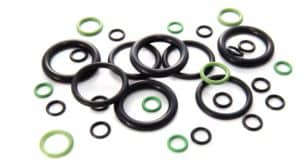HNBR O-Ring Material Description
 Hydrogenated Nitrile (HNBR) o-rings, also known as Highly Saturated Nitrile (HSN), are made of a synthetic polymer that is obtained by saturating the double bonds in nitrile=s butadiene segments with hydrogen. This special hydrogenation process reduces many double bonds in main chains of NBR polymers. This process results in the superior heat, ozone, chemical resistance and mechanical characteristics of HNBR over standard Nitrile. HNBR o-rings are available in 70 durometer, 80 durometer, and 90 durometer.
Hydrogenated Nitrile (HNBR) o-rings, also known as Highly Saturated Nitrile (HSN), are made of a synthetic polymer that is obtained by saturating the double bonds in nitrile=s butadiene segments with hydrogen. This special hydrogenation process reduces many double bonds in main chains of NBR polymers. This process results in the superior heat, ozone, chemical resistance and mechanical characteristics of HNBR over standard Nitrile. HNBR o-rings are available in 70 durometer, 80 durometer, and 90 durometer.
HNBR o-rings are preferable for use with petroleum-based oils and fuels, aliphatic hydrocarbons, vegetable oils, silicone oils and greases, ethylene glycol, water and steam (up to 300ºF), and diluted acids, bases, and salt solutions. HNBR o-rings are not preferable for use with chlorinated hydrocarbons, ketones, ethers, esters, and strong acids.
Acrylonitrile Content:
Just like NBR, there are different levels of Acrylonitrile (ACN) content in different HNBR polymers. The ACN content can be varied from 17% to 49%. Lower ACN content gives better low-temperature properties but lesser resistance to fuels and polar lubricants. Higher ACN content gives inferior low-temperature properties but improves fuels and polar lubricants resistance. Standard HNBRs typically have 36% ACN content.
Cure System, Peroxide-Cured:
HNBR o-rings are usually peroxide-cured but can also be sulfur-cured to improve flexible properties in dynamic systems. However, sulfur-curing will reduce the heat resistance and cause an inferior compression set.
HNBR O-Ring Temperature Range:
Standard Low Temp: -40°C (-40°F)
Standard High Temp: 150°C (302°F)
SPEC SHEET: HNBR 70 Durometer
SPEC SHEET: HNBR 80 Durometer
SPEC SHEET: HNBR 90 Durometer
SHOP FOR HSN/HNBR O-RINGSProduct Inquiry
Preferred Environments to Use HNBR O-Rings
Performs Well In:
- Petroleum based oils and fuels
- Aliphatic hydrocarbons
- Vegetable oils
- Silicone oils and greases
- Ethylene glycol
- Dilute acids, bases, and salt solutions to moderate temperatures
- Water and steam to 150ºC (300ºF)
Doesn't Perform Well In:
- Chlorinated hydrocarbons
- Ketones
- Ethers
- Esters
- Strong acids

 English
English  Español
Español  Français
Français  Português
Português  Deutsch
Deutsch  Italiano
Italiano  Русский
Русский  中文
中文  日本語
日本語  العربية
العربية  हिन्दी
हिन्दी